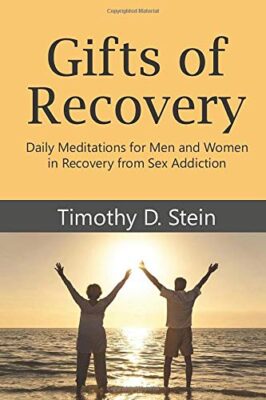 By Tim Stein
By Tim Stein
Meditation from Gifts of Recovery.
Sleeper Waves.
–Therapy Metaphor
If we are hanging out at the beach and we assume we have a sense of the rhythm and strength of the waves, it can be tempting to turn our back to the water and focus elsewhere. This is when we are most vulnerable to sleeper waves, the larger, more powerful waves that get mixed in with a normal set of waves. When our back is turned and a sleeper wave hits, at the very least we get wet; at the worst, we die. Sobriety from addiction has this same dynamic. Just when we believe we understand the strength and rhythm of our addictive urges and we stop paying attention, there often comes a sleeper wave of addictive energy. At best, we find ourselves struggling with our addictive urges and triggers; at worst, we relapse and experience all the painful consequences that come with a relapse.
What does it look like when I stop paying attention to my addiction? When have I been hit by a sleeper wave of addictive energy? What gifts await me as I maintain awareness of my addiction even when I feel comfortable with the addictive patterns and confident in my sobriety?
* * * * * * * * * *
Where I live in Northern California, there are some absolutely stunning beaches. Spending a warm day on the beach is truly a treat whether you enjoy a picnic, sandcastles, playing in the waves, swimming, or surfing. The ocean is a magnificent gift. It is also a gift that deserves respect. On many beaches in my area, posted signs warn of “deadly sleeper waves and hazardous surf.” Sleeper waves are mixed in with smaller sets of waves and run up the beach much farther and with much more power than other waves. If you have “fallen asleep” to the danger of the ocean, these waves catch you unaware with potentially significant consequences.
 Many of us have had a client who has done excellent work, felt like they had made changes, and then stopped paying attention to a particular issue, believing that the changes they have made and were experiencing would continue independently. Then, these same clients come back to us, either in the next session or years later, reeling from the re-emergence of the same issue either in its original form or in a new variation. In these situations, the sleeper wave metaphor provides an effective cautionary tale. Even when things feel peaceful, it is important to be aware of the ocean, so the occasional sleeper wave does not catch you unaware. This is not a message encouraging constant paranoia but instead recommending a life of continued awareness.
Many of us have had a client who has done excellent work, felt like they had made changes, and then stopped paying attention to a particular issue, believing that the changes they have made and were experiencing would continue independently. Then, these same clients come back to us, either in the next session or years later, reeling from the re-emergence of the same issue either in its original form or in a new variation. In these situations, the sleeper wave metaphor provides an effective cautionary tale. Even when things feel peaceful, it is important to be aware of the ocean, so the occasional sleeper wave does not catch you unaware. This is not a message encouraging constant paranoia but instead recommending a life of continued awareness.
This message is especially important for addicts. I have found it a common experience that addicts gain a modicum of sobriety, feel the addictive energy slowly lessen to a manageable and recognizable ebb and flow, only to be hit by a sleeper wave of addictive energy. If an addict is not prepared for this, they relapse. Preparing a client to remain aware even when sobriety feels easy is essential to their successful long-term sobriety. Likewise, encouraging an addict to continue developing and practicing the tools they find effective in supporting their sobriety, even when things feel comfortable, is teaching them the patterns that create and support successful long-term sobriety. While we, as clinicians, cannot do this work for them, we can help them to prepare for common addiction challenges.
We, as wounded healers, can apply these principles to our own lives. We can do this in the obvious ways such as keeping a recovery routine in place, maintaining consistent contact and rigorous honesty with recovery peers, and being aware of potential challenges whether these are addictive issues or other issues. We can also do this in more subtle ways such as being receptive when our partner shares fear, concerns, or a sense of unease, acknowledging when a similar challenge shows up in our life multiple times, or noticing when our advice and guidance to clients has a deeper resonance for us than usual.
No one is exempt from the dangers of life’s sleeper waves. It is to our benefit to live in awareness.
* * * * * * * * * *
Seeking Integrity and Dr. Rob Weiss offer a weekly online consultation group for sex addiction therapists. Participants discuss how to handle difficult or unusual clients, as well as how to balance life with being a therapist. For more information, contact Tami VerHelst at this link.
